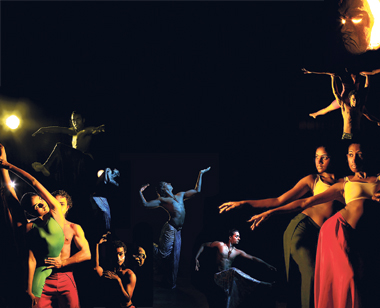A lone dancer igniting feelings of jealousy in another… Two more dancers, the envy of some other… Betrayed boys, showing their anger, moving to one rhythm… In comes another dancer, anger boils over, a sense of powerlessness created through jealousy… Issuki
Jealousy is something that is often spoken of, but rarely shown through dance. Or, when it is shown, it is so clearly stated, there's no guesswork needed. But Issuki, a dance performance by nATANDA Dance Theatre of Sri Lanka offers you, the audience, some food for thought.
We caught up with several dancers of nATANDA Dance Theatre as well as its founder who told us more about the production.
Issuki, means jealousy in Sanskrit, explains Kapila Palihawadana, founder and choreographer of nATANDA. And as the name suggest, the production explores the theme of jealousy. However, says the dancers, jealousy is not directly addressed. Instead, they add, the various dances lay out the causes of jealousy, the events and human conditions that lead towards arousing feelings of jealousy within a person.
The night's performance would be in two parts. The first consisting of more contemporary dance styles such as jazz and modern ballet, while the second part is based on the theme of jealousy, with different dances being performed to portray the different types of emotions and human conditions of jealousy – loneliness, agitation, fear, envy, betrayal, anger, depression, cowardliness, being hurt and feeling powerless.
The production also features a combination of three distinct dance forms – traditional Kandyan dance, the more contemporary dance styles such as jazz and modern ballet as well as Angampora, Sri Lanka martial arts.
"Angampora is mainly used during the dance portraying anger performed by a group of boys", says, Ruchira Kolomba Arachchi (25). He adds, that this dance style is perfect to display the masculine power.
Explaining the reason behind picking such a dance form, Malith Upendra (23) says that there's a lot local audience can relate to in this. "Western countries tend to use ballet, just like that, using Angampora gives a Sri Lankan identity and a whole new dimension to the production." He adds, that this was not easy. "This is a new style to most of us. We spent months perfecting it."
The two are both part of the dance, anger, one of the most common emotions, featured towards the end of the production, where several boys move to a one rhythm, before a female dancer enters the stage and steals the limelight. This causes jealousy and confusion among the boys, resulting in a little clash of sorts, the two boys explain.
Malith and Ruchira are also part of other dances, among them envy, agitation and betrayal. "One leads to another", they explain. On betrayal, they say, "This features two boys who, having been betrayed, are now coming to terms with what has occurred."
Neelika Perera (20), who starts off the second half of the production in loneliness, says, that this particular item, invokes jealousy in others who see her dancing alone. "I am dancing alone and then the others watch me and this arouses feelings of jealousy in them. They then come into the stage to do the same thing", she says.
Dakshika Bandara (21), explaining her part in the duet in envy, which follows loneliness, says, "When two outsiders see us dancing, they feel jealous. They begin to imitate us."
The girls, who have been with Kapila for the past five years, regard this production as something different to what they've done before.
"We started off by learning Kandyan dances so these dance forms are rather new to us. And, we've got to portray these emotions and feelings through body movements and expressions. This takes a lot of practice. We need to really understand that emotion and what happens there," they say.
The final dance in Issuki is on feeling powerless. "Here, people realize that it is you who suffer as a result of feeling jealous. And when this happens there is this feeling of powerlessness, you are fed up," says Ruchira.
Talking about the music, well, Kapila says, it's rock music, used in a very different way. He adds, it helps bring out the theme of jealousy better. But there is also a mixture of other music, such as the mellow, Indian tunes. The costumes are minimalistic. There is not a lot of jewellery and priority is given to the dancers' bodies. For a dancer, the body is everything. "It's the instrument. They talk through their body; they talk through expressions and movement," Kapila says, adding that this is not an easy task.
He also says that he is grateful to the German Cultural Institute for their support, especially its director, Mr. Richard Lang.
The production ends with dancers repeating, "Irshya, irshya, irshya…" A reminder that jealousy is still there. But, as the dances portray, it's the causes or reasons for jealousy that one needs to be aware of.
Issuki would be performed on November 27 at 7.30pm. at the British School. Tickets can be purchased from the British School. The Sunday Times is the print media sponsor for the event.
|

